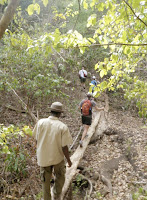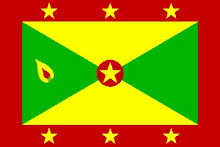
Sweating like an Olympian during my first hash
Of the many fabulous things to do in Grenada, hashing may become one of my favorites. Hashing combines hiking, mazes, food, music, and (responsible/optional) alcohol consumption.
Essentially, lead "hashers" create 2 new trails in the bush: one for walkers and one for runners (I'm petitioning for a crawler's trail until I get in better shape). After signing in, a leader goes over the guidelines, like how to identify false trails and the various calls you use to follow the correct trail. They also rag on people that wear new shoes and forewarn them of post-hash consequences. The EC81 group that went decided to take the walkers trail since it was our first hash and we did not want to tempt death more than was necessary.

Kids playing in a mini-waterfall
While waiting for a ride to the hash site I met two older ex-pats (one American man and one German woman) with a crazy hippie vibe who live on a boat. The woman served in a German version of the Peace Corps in Africa. The random woman who picked the three of us up was playing the Beach Boys Greatest Hits, which was a nice reminder of home. There seemed to be a good mix of Grenadians, St. George's University students, ex-pats, and us PC Volunteers. That being said, I have not seen so many non-Grenadian (read: "white") people in one place here.We limed for a bit and met Rion (not sure if that's how you spell his name, this is my lame attempt to make it look exotic), a Grenadian friend of another PCV who graciously offered to guide us on the hash. We then saw people scatter and tumble over fallen branches, signaling the start of the hash. The first section was a hike up the side of a mountain, with parts that required me to grasp desperately to tall grasses, branches, strangers, etc. Also, in an effort to prevent dehydration, I drank (water) gratuitously pre-hash, which caught up with me mid-mountain. Mercifully, there was a sheet of scrap metal that I could hide behind to remedy the situation. Getting rid of that extra water weight allowed me to scale the mountain a bit easier and quicker than before.
At the summit, we had a beautiful view of the Grenadian bush with the ocean in the distance, for which no camera can do justice. I thought the worst was over, and in a way it was, but I underestimated the climb down the mountain. I swallowed my pride and rode down the dirt trail as if it were a slide in a playground. People from this point on would constantly ask me where I fell. At one point, we came across some goats which Rion retied in a more humane fashion and a beach where we took a well deserved swim.

I heart goats big time
Although it was only supposed to take us only 90 minutes to finish the hash, it took us closer to 3 hours (due to our repeated stops and occasional wandering and goat feeding). Once we returned to the starting point, the group rounded up first-time hashers to run through a crowd of people spraying beer at them. Thankfully, we managed to avoid this. Reeking of beer, sweat, and having a dirt-streaked booty would certainly not assist effective community integration. To top it all off, they had a young man drink beer from his shoe (post-hash!) since it was new, and wearing new shoes to a hash is just straight-up silly.All in all, a fantastic time.
To learn more about the crazy funness that is hashing, visit the official site: www.grenadahash.com

I must have done something amazing in a past life to have been placed here




